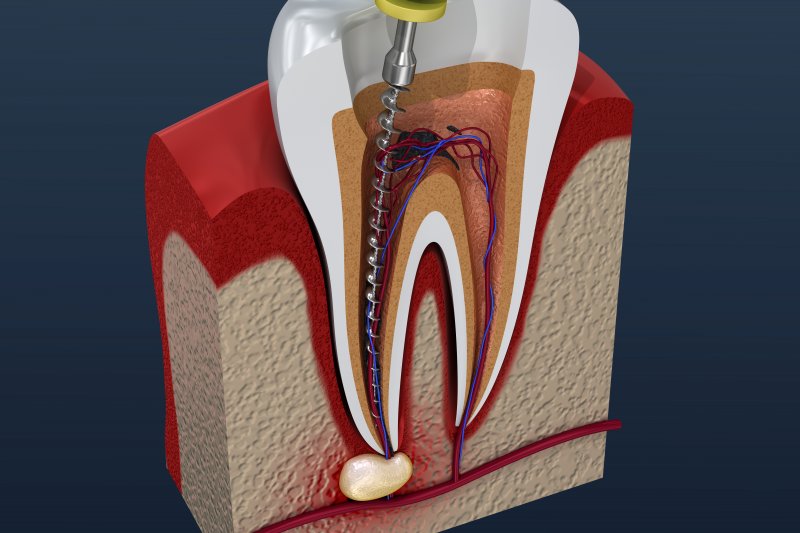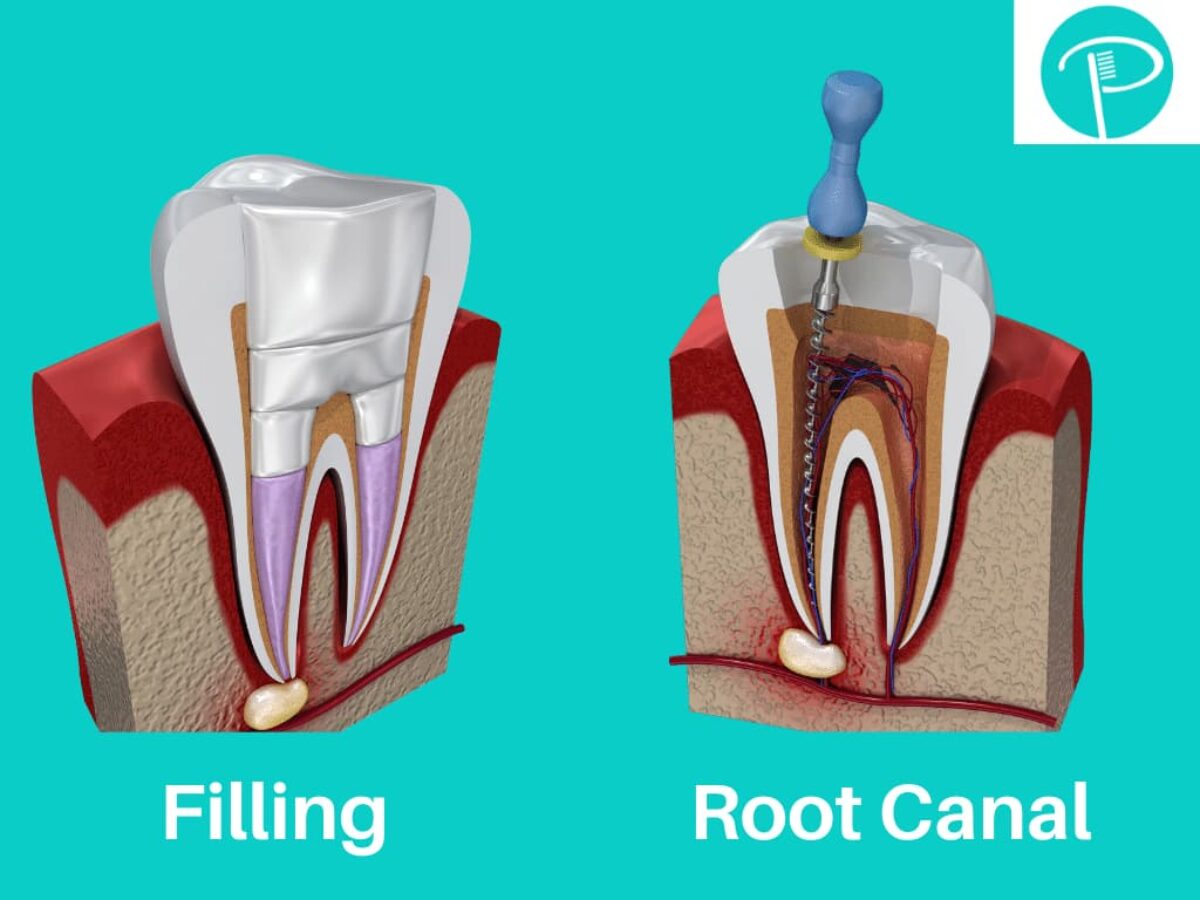With proper care, even teeth that have had root canal treatment can last a lifetime. But sometimes, a tooth that has been treated doesn't heal properly and can become painful or diseased months or even years after treatment. If your tooth failed to heal or develops new problems, you have a second chance.Root canal risks – Other complications
In an extremely small percentage of patients, the surrounding nerves around the affected tooth can be disrupted by the root canal procedure. In some cases, this can cause numbness in that area. This is nothing to worry about – it usually goes away within a few weeks.Foul Taste or Odor: An unpleasant taste or smell emanating from the tooth. Prolonged Sensitivity to Hot or Cold: Sensitivity that lasts longer than expected after the procedure. Bump on the Gums: A noticeable bump or pimple-like formation on the gums near the treated tooth.
Can you heal a tooth that needs a root canal : No. It isn't possible to cure an infected root canal naturally.
Why does my 20 year old root canal hurt
Reasons for Pain Years Later Following a Root Canal
Sometimes a tooth does not fully heal, and the infection returns later. Cleaning the infection from curved canals in tooth roots can be difficult for a dentist. If the infection persists, the tooth will become problematic in the future.
Can a 20 year old root canal get infected : Root canal reinfection isn't common, but it isn't unheard of either. Root canal procedures are overwhelmingly successful; however, a previously treated tooth can become reinfected days, weeks, months, or even years after the initial procedure.
What are the dangers The bacteria that is left behind during a Root Canal can cause many health problems. While certain bacteria is common in the mouth, when it has led to an infection it becomes dangerous. Some of the conditions that may occur include malaise, inflammation and abscess in the head or neck. If you experience severe pain when chewing or applying pressure to the tooth, swelling in the gums or face, a darkening of the tooth, sensitivity to hot and cold temperatures, bad breath, an unpleasant metallic taste in the mouth, or drainage of pus from the gum, you may have a root canal infection.
Can you see a failed root canal on xray
Firstly, an X-ray can reveal crucial indicators of a failed root canal, including signs of infection, incomplete fillings, and changes in bone structure. The quality of the X-ray image and the expertise of the endodontist are critical factors in accurate diagnosis.Root canal therapy involves lower overall cost, less discomfort, and less time spent in the dentist's chair. Though tooth extraction may look like an attractive option initially, it's clear that root canal treatment is the ideal treatment option.Direct Pulp Capping
Used to treat severe damage or decay on a tooth that exposes the pulp, this is the number one recommended alternative to root canal procedures by most doctors. This procedure is applied when the pulp exposure is minimal, and there is little to no decay or inflammation. Ozone gas: Ozone gas can be used to kill bacteria in the root of a tooth. However, ozone gas does not seal up any decay or damage, so it may not be a long-term solution. Ozone gas has a short half-life and is usually required weekly to relieve symptoms in the short term.
How do you know if an old root canal is infected : Sensitivity to hot and cold, or lingering pain after consuming hot or cold food. Sharp pain when biting down or when tapping the teeth together. Constant pain and pressure. Swelling of the gums, with or without the presence of a pimple-like bump near the tooth on the gums.
Can a root canal go bad after 30 years : If you take proper care of your tooth that has been treated with root canal therapy, it can last a lifetime. However, there might be a few reasons why your treatment could “go bad” and require retreatment, such as: Narrow or curved root canals were not treated during the first procedure.
Why do dentists always want to do root canals
Root canals eliminate tooth infections that, left untreated, could cause serious issues like: Infection that spreads to other teeth. Jawbone damage. Although the antibiotics minimize the swelling and the infection, it will not heal the tooth. Your symptoms may subside, but they will quickly return if the tooth is not treated with root canal therapy because the source of the issue has not been resolved, such as decay.In certain cases, a dental CT may be necessary to determine the extent of the infection. Since early root canal infections may not show up on the x-ray, Dr. Nerness will also complete a thorough examination of your teeth to evaluate for signs of infection.
What happens if you ignore a failed root canal : Spread of Infection
Otherwise, the infection will continue to spread even to the surrounding teeth, the surrounding bone tissue, and soft tissue and throughout your entire mouth. The infection might even spread to other parts of your body and it sometimes may be life-threatening.
Antwort Can a root canal cause problems years later? Weitere Antworten – Can a root canal tooth hurt years later
With proper care, even teeth that have had root canal treatment can last a lifetime. But sometimes, a tooth that has been treated doesn't heal properly and can become painful or diseased months or even years after treatment. If your tooth failed to heal or develops new problems, you have a second chance.Root canal risks – Other complications
In an extremely small percentage of patients, the surrounding nerves around the affected tooth can be disrupted by the root canal procedure. In some cases, this can cause numbness in that area. This is nothing to worry about – it usually goes away within a few weeks.Foul Taste or Odor: An unpleasant taste or smell emanating from the tooth. Prolonged Sensitivity to Hot or Cold: Sensitivity that lasts longer than expected after the procedure. Bump on the Gums: A noticeable bump or pimple-like formation on the gums near the treated tooth.

Can you heal a tooth that needs a root canal : No. It isn't possible to cure an infected root canal naturally.
Why does my 20 year old root canal hurt
Reasons for Pain Years Later Following a Root Canal
Sometimes a tooth does not fully heal, and the infection returns later. Cleaning the infection from curved canals in tooth roots can be difficult for a dentist. If the infection persists, the tooth will become problematic in the future.
Can a 20 year old root canal get infected : Root canal reinfection isn't common, but it isn't unheard of either. Root canal procedures are overwhelmingly successful; however, a previously treated tooth can become reinfected days, weeks, months, or even years after the initial procedure.
What are the dangers The bacteria that is left behind during a Root Canal can cause many health problems. While certain bacteria is common in the mouth, when it has led to an infection it becomes dangerous. Some of the conditions that may occur include malaise, inflammation and abscess in the head or neck.

If you experience severe pain when chewing or applying pressure to the tooth, swelling in the gums or face, a darkening of the tooth, sensitivity to hot and cold temperatures, bad breath, an unpleasant metallic taste in the mouth, or drainage of pus from the gum, you may have a root canal infection.
Can you see a failed root canal on xray
Firstly, an X-ray can reveal crucial indicators of a failed root canal, including signs of infection, incomplete fillings, and changes in bone structure. The quality of the X-ray image and the expertise of the endodontist are critical factors in accurate diagnosis.Root canal therapy involves lower overall cost, less discomfort, and less time spent in the dentist's chair. Though tooth extraction may look like an attractive option initially, it's clear that root canal treatment is the ideal treatment option.Direct Pulp Capping
Used to treat severe damage or decay on a tooth that exposes the pulp, this is the number one recommended alternative to root canal procedures by most doctors. This procedure is applied when the pulp exposure is minimal, and there is little to no decay or inflammation.

Ozone gas: Ozone gas can be used to kill bacteria in the root of a tooth. However, ozone gas does not seal up any decay or damage, so it may not be a long-term solution. Ozone gas has a short half-life and is usually required weekly to relieve symptoms in the short term.
How do you know if an old root canal is infected : Sensitivity to hot and cold, or lingering pain after consuming hot or cold food. Sharp pain when biting down or when tapping the teeth together. Constant pain and pressure. Swelling of the gums, with or without the presence of a pimple-like bump near the tooth on the gums.
Can a root canal go bad after 30 years : If you take proper care of your tooth that has been treated with root canal therapy, it can last a lifetime. However, there might be a few reasons why your treatment could “go bad” and require retreatment, such as: Narrow or curved root canals were not treated during the first procedure.
Why do dentists always want to do root canals
Root canals eliminate tooth infections that, left untreated, could cause serious issues like: Infection that spreads to other teeth. Jawbone damage.

Although the antibiotics minimize the swelling and the infection, it will not heal the tooth. Your symptoms may subside, but they will quickly return if the tooth is not treated with root canal therapy because the source of the issue has not been resolved, such as decay.In certain cases, a dental CT may be necessary to determine the extent of the infection. Since early root canal infections may not show up on the x-ray, Dr. Nerness will also complete a thorough examination of your teeth to evaluate for signs of infection.
What happens if you ignore a failed root canal : Spread of Infection
Otherwise, the infection will continue to spread even to the surrounding teeth, the surrounding bone tissue, and soft tissue and throughout your entire mouth. The infection might even spread to other parts of your body and it sometimes may be life-threatening.